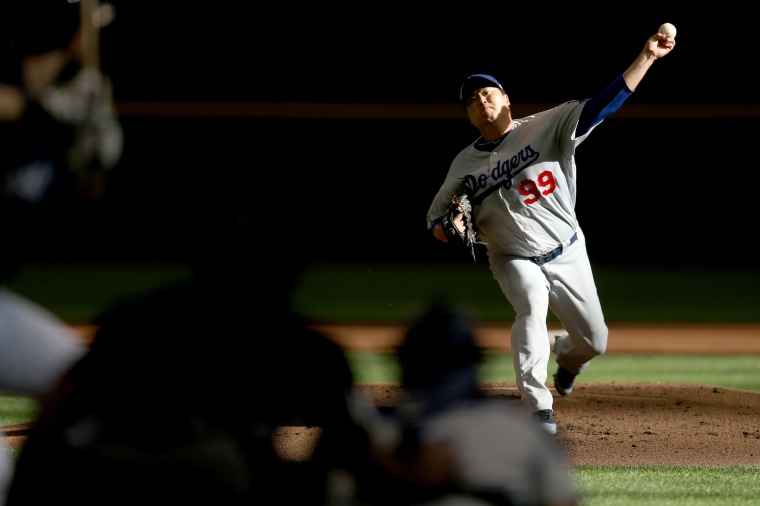LOS ANGELES — College football was airing on numerous channels on a recent drizzly Saturday — not that you could tell in Los Angeles's Koreatown.
In both Cafe Nandarang and Toe Bang Cafe, virtually every television was tuned to pitcher Hyun-Jin Ryu's final start of the regular season for the hometown Dodgers. This is the norm in Koreatown establishments when Ryu is throwing.
Ryu, an import from South Korea’s major leagues who has starred for the Dodgers since 2013, has earned the attention. He's among the favorites to win the Cy Young award for best pitcher in the National League this year after leading the Dodgers to their seventh-straight postseason berth.
But Ryu's impact has gone beyond balls and strikes. He's connected the 300,000-plus Korean Americans living in the Greater Los Angeles area with his electrifying performances.
Ryu is continuing down the path that Chan-Ho Park blazed in 1994 as the first Korean to play in a Major League Baseball game, also for Los Angeles. Partly because of interest in Ryu, the Dodgers partnered with Radio Korea in 2014 to become the first major league team to offer Korean-language broadcasts for every game.
"The first generation, they just got here and as parents, they have kids who speak English ― they have communication problems," Dodgers broadcaster Chong-ho Yim told the Korea Times in 2014. "Radio Korea provides Korean-language programs so they don't feel homesick and they don't feel far away from home."
In the intervening years, Ryu has also bridged the gap between first-generation immigrants and their children, according to Henry Kim, a nurse from Los Angeles.
"Ryu allows Koreans and Korean Americans to have a sense of unity, pride and connection to one another, even though there might be a huge generation and culture gap between the two," Kim, 32, said.
Ryu hasn't been just a source of pride for Korean Americans — he's been a source of national pride, even for second-generation fans.
That's what a 2018 University of Illinois study by Na Ri Shin, Jon Welty Peachey and Doo Jae Park found. For this study, Shin, Peachey and Park spoke with six Korean American fans of Ryu, all caught between two cultures:
"The feeling of being connected to the motherland is very meaningful to them because they have experienced identity crises while growing up in the USA.
"Participants mentioned the fact that Ryu being 'fully' Korean, which means he was born in Korea and is 100 percent Korean descent, was appreciated by the Korean American community and helped Korean American fans establish a stronger connection," according to the study.
"He connects me to Korea," one participant in the study said of Ryu.
"Korean pride is very strong," another participant said. "Probably it's stronger than other ethnic backgrounds."
Ryu is also helping to transcend stereotypes about Asian masculinity: He's not a doctor. He's not a liquor store owner. He's a 6-foot-3, 250-pound athlete.
The crowds that hang on Ryu's every pitch are reminiscent of the Asian American fans that would gather to watch the NBA’s Jeremy Lin in action during the height of "Linsanity." In this way, Ryu's success isn't important just to Korean Americans, but all Asian Americans.
“Participants clearly recognized that excelling in sports is not something an Asian American or a Korean American would or could do,” Shin, Peachey and Park wrote. “They described what Ryu had been doing in the team as an athlete and in his life outside of sport as a Korean figure as something they had not been able to do; breaking racialized, ethnicized and gendered stereotypes.”
For Kim, Ryu is just one of many recent Asian success stories that is changing external and internal perceptions of Asian Americans everywhere, not only in sports.
"Ryu shines light not only on Korean Americans, but other Asian Americans who may be next in line to success in other industries than sports," Kim said. "After many years of not being represented in American society, this movement is inspiring and motivating."
CORRECTION (Oct. 11, 2019, 11:09 a.m. ET): A previous version of this article misspelled the name of one of the study's authors. He is Doo Jae Park, not Doe Jae Park. It also misstated the age of Henry Kim. He is 32, not 33.
Follow NBC Asian America on Facebook, Twitter, Instagram and Tumblr.

